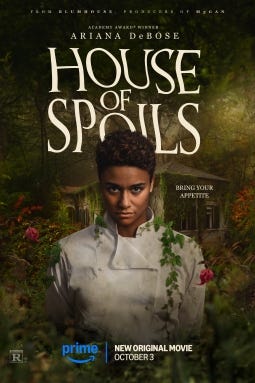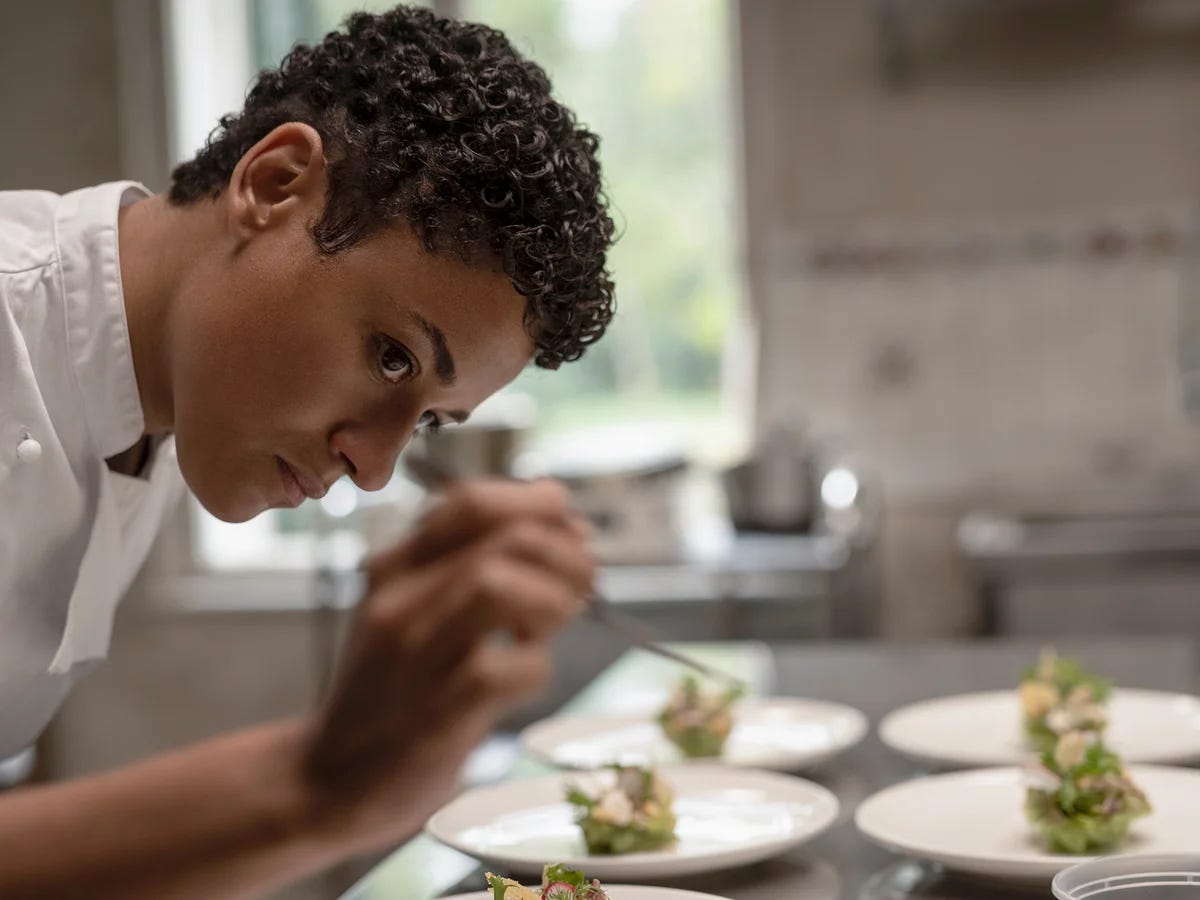"House of Spoils" - Supernatural Horror or Fairy Tale?
Or what happens when you place a chef in the middle of nowhere with a bunch of mold and bugs?
👩🍳👩🍳👩🍳 (out of 👩🍳👩🍳👩🍳👩🍳👩🍳)
Director: Bridget Savage Cole, Danielle Krudy
Screenplay by: Bridget Savage Cole, Danielle Krudy
Cinematography: Eric Lin
Starring: Ariana DeBose, Barbie Ferreira, Arian Moayed
“House of Spoils,” starring Ariana DeBose, is an interesting film. I generally enjoyed it, but there were also problems that led to my not absolutely loving it. For starters, this is billed as a supernatural horror film, which isn’t what I would classify it as at all. Well, supernatural? Yes. Horror? No.
There’s nothing scary about this film, though it tries its hardest to evoke a growing tension throughout. The film features a few jump scares and spends some time trying to convince you that DeBose’s character is becoming so stressed she’s losing it, but then it just…switches gears entirely. It’s as if the movie spent the majority of its time telling you one story, only to change to a wholly different story in the last 15 minutes, and I can’t say I was a fan of that.
So, what is “House of Spoils” about? The story follows Elena (DeBose), a chef at a fancy schmancy restaurant who quits her job to run her own place. The new restaurant is out in the boonies, in the middle of nowhere, and the isolated location does its best to work against DeBose, leaving her unable to find certain ingredients when she needs them and with too few workers. Plus, there’s the creepy vibe the place gives off and the mysterious garden she finds in the woods. Soon enough, Elena is dealing with a massive amount of stress, bugs, mold, a possible witch haunting the place, and a sous chef who faked her resume to get the job.
Despite the possible ghost witch, I still maintain this isn’t horror. I’d call it folklore, myth, or maybe even a fairy tale, but not horror. It’s a story of working against all odds to get what you want and one of rebirth and empowerment; the story just happens to involve a possible ghost witch and a mysterious garden as a framework for these things. The framework manages to do the job it’s there for, but it probably would have worked better had the movie not tried so hard to convince us spooky chaos was afoot.
DeBose’s Elena takes a journey (sometimes through some vaguely dark places) to reach her full potential, and that full potential ends up playing into the wild and feminine mystique trope with a penultimate scene that evokes Dionysus’ followers, the maenads. If you look closely, you’ll also catch a few other elements throughout the film that seem to hint at stories such as the tale of Hades and Persephone, “The Crucible”, “Alice in Wonderland,” and maybe even a bit of “Hansel and Gretel.” It’s a mish-mash of classics that almost achieves its goal.
DeBose is the best thing about this film. I wasn’t familiar with her before “House of Spoils,” but she brought an earnest sort of vulnerability and determination to the role of Elena that helps one ignore the fact the character doesn’t seem to be fully fleshed out. Barbie Ferreira, as Lucia, makes a good foil for the character of Elena, as she’s also trying her hardest to work to where she wants to be but is much further behind the other chef. The rest of the characters have little to no impact on the plot, as they mostly just pop in and out to cause Elena more stress.
The cinematography might be my favorite aspect of “House of Spoils” (other than DeBose). The location was beautiful, and the folklore element was really played up in the set design, but the camerawork is responsible for the majority of what little “creepiness” can be found here. I thought the night scenes, particularly near the end, were wonderfully shot.
A couple of other things just didn’t work for me personally and may not work for others. If you have problems with food and bugs mixing (which I do), you might not love this film. Also, what was up with nobody wearing gloves in the kitchens of these fancy restaurants? They were all just touching the food with their hands, which seemed highly unsanitary.
Overall, “House of Spoils” is mostly interesting (mainly due to DeBose’s performance), but the story is lacking, as it seems not to know what kind of story it wants to tell. This is far from the worst film I’ve ever seen, but it might not be enjoyable to all. There was definitely a lot of potential here, though, and I’d be interested to see what the scriptwriters/directors manage to do next.
What did you think of “House of Spoils?” Let me know in the comments!






